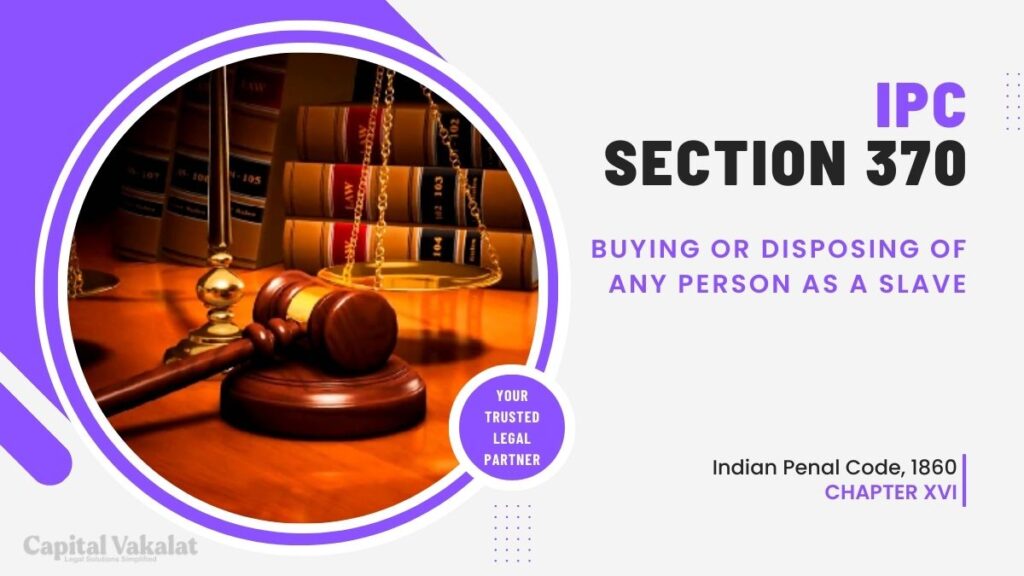Human trafficking, a heinous crime that violates the very essence of human dignity, has been a pervasive issue across the globe. In India, the legal framework to combat such offenses is encapsulated in Section 370 of the Indian Penal Code (IPC). This article explores the depths of Section 370 IPC, its historical context, global perspectives on human trafficking, challenges in implementation, impact on victims, notable cases, government initiatives, the role of technology, and calls for reform.

In a world that strives for justice and equality, the existence of crimes like human trafficking remains a stark reminder of the dark corners society needs to address. Section 370 IPC specifically targets the buying or disposing of any person as a slave, highlighting the legal gravity assigned to such actions. Understanding the significance of this section is paramount in the pursuit of eradicating modern-day slavery.
Historical Context
The evolution of laws related to slavery can be traced back through centuries. While the world has made strides in abolishing explicit forms of slavery, the emergence of human trafficking in contemporary times necessitates stringent legal measures. Section 370 IPC, therefore, becomes a crucial tool in combating this evolving menace.
Understanding Section 370 IPC
To effectively address the buying or disposing of any person as a slave, it is imperative to delve into the legal nuances of Section 370 IPC. This section not only defines the offense but also outlines the elements that constitute a violation. The penalties associated with this offense serve as a deterrent, emphasizing society’s intolerance towards such crimes.
Global Perspectives on Human Trafficking
Human trafficking is not confined by borders, making it a global challenge that demands international cooperation. Examining how Section 370 aligns with global initiatives provides insights into India’s commitment to combating human trafficking and participating in the collective effort to eradicate this crime.
Challenges in Implementing Section 370
While the legal framework is in place, implementing Section 370 comes with its own set of challenges. Legal complexities and loopholes can sometimes impede the efficient prosecution of offenders. This section explores the collaborative efforts between law enforcement agencies and non-governmental organizations to overcome these challenges.
Impact on Victims
Beyond the legal realm, the impact of human trafficking on victims is profound. The psychological and physical consequences endured by those who fall prey to such crimes are often lifelong. This section sheds light on the rehabilitation and support mechanisms essential for the recovery of survivors.
Notable Cases
Examining instances where Section 370 was invoked provides a glimpse into the legal precedents set in the fight against human trafficking. Understanding the outcomes of these cases serves as a benchmark for the efficacy of the legal measures in place.
Government Initiatives
Governments play a pivotal role in addressing human trafficking. This section explores the steps taken by governments to strengthen anti-trafficking measures, emphasizing the importance of awareness campaigns in mobilizing public support.
Role of Technology
In the age of technological advancement, leveraging technology becomes crucial in tracking and combating human trafficking. This section discusses the current utilization of technology in the field and envisions potential advancements that could further enhance these efforts.
Calls for Reform
As with any legal framework, the effectiveness of Section 370 comes under scrutiny. Evaluating its strengths and weaknesses, this section proposes suggestions for reform to ensure the continual improvement and strengthening of legal frameworks aimed at eradicating human trafficking.
Conclusion
In conclusion, Section 370 IPC stands as a formidable weapon in the battle against human trafficking. While progress has been made, challenges persist, and there is an ongoing need for collective efforts to refine and fortify the legal mechanisms in place. The fight against human trafficking requires not just legal measures but a societal commitment to justice and compassion.
Frequently Asked Questions
What are the penalties for violating Section 370?
Penalties for violating Section 370 include imprisonment, fines, or both, depending on the severity of the offense.
How does technology contribute to combating human trafficking?
Technology aids in tracking and preventing human trafficking by facilitating data analysis, monitoring high-risk areas, and improving communication between law enforcement agencies.
Are there any international treaties addressing human trafficking?
Yes, several international treaties, such as the United Nations Protocol to Prevent, Suppress and Punish Trafficking in Persons, supplement national efforts to combat human trafficking.
What role do NGOs play in combating human trafficking?
NGOs play a crucial role in providing support to victims, raising awareness, and collaborating with governments to strengthen anti-trafficking measures.